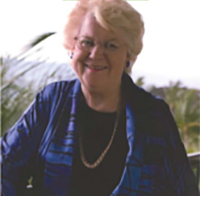
Marlene Wilson’s basic philosophy about volunteerism is summed up in these few words, words once quoted by then President George H. Bush during National Volunteer Week in 1991:
“Caring must strengthen into commitment and commitment into action.”
Wilson came to her volunteerism professional gradually. After college, she worked for a year at a psychiatric hospital and then in human resources management for six years. She then found her passion, applying business management principles to the field of volunteerism in all sectors, including the church. In 1968, the helped create the Volunteer and Information Center of Boulder County, Colorado – the first such center in the state. Wilson served as the center's first executive director, leading it to become a national model for developing volunteer centers across the United States.
In the early 1970s, Wilson began traveling beyond Colorado to do training in Volunteer Management. Quickly becoming well-known, she presented upwards of 200 workshops and keynote speeches a year, leading the way for all the other authors, consultants and trainers in the field. With a unique and refreshing perspective, she shared her vision and wisdom on such topics as creativity, influence, marketing, leadership, time management burnout, organizational climate, motivation and change. She was also an expert in the management and leadership skills needed to effectively lead Volunteer Programs.
A true pioneer, Wilson was the first to take an interdisciplinary approach to Volunteer Management, including basic principles of psychology, communications and business administration. In 1976, she self-published The Effective Management of Volunteer Programs; at the time, no publishing house was willing to take a chance on it! The book stood alone for over a decade as the only comprehensive guide to the principles of engaging volunteers in agencies, ultimately selling over 150,000 copies.
Similarly, Wilson was a trailblazer who identified churches and the rest of the faith community as the “sleeping giant” of volunteerism. Her 1983 book, How to Mobilize Church Volunteers, was the first work to apply Volunteer Management principles to the special needs of faith-based institutions, and it became the sentinel guide for directors of lay ministry everywhere. Throughout her life she continued to pursue a mission to strengthen how congregations work together, both to serve one another and to address social concerns.
One of Wilson’s greatest gifts to the field was the creation of the Volunteer Management Certificate program through the University of Colorado in 1972 – the first of its kind. Within a few years, it became known as the place to come to for a great education and to have one’s passion rekindled. She recruited outstanding trainers and consultants in the field to serve as faculty, attracting attendees from all over the U.S. and Canada. During the program’s 25 years of existence, hundreds of people spoke of how their participation had been a life-changing experience.
Wilson's consulting and publishing firm, Volunteer Management Associates, continued to teach, inspire and advocate for leaders of volunteer engagement for over 30 years. Wilson made countless videos and travelled around the world as a speaker, sharing her passion, knowledge and compassion with thousands. She received an Honorary Doctorate of Divinity from Wartburg College, and received countless awards and accolades for her work. As a final legacy, 16 of her most popular presentations were published in Visionary Leadership for Volunteer Programs in 2008; readers of this timeless volume will experience how Wilson moves from the "hows" to the "whys" of Volunteer Engagement. Her words urge all who lead volunteers to move beyond thinking of themselves as managers to thinking of themselves as leaders—those who develop vision for volunteer programs and impart that vision throughout an organization.
Wilson died in 2019.
(Bio Sources: “Remembering Arlene” article by Jackie Norris. Chapter in her Visionary Leadership book, with biography and reflections from Betty Stallings, Jane Justis and Susan J. Ellis)
“She had a generosity of spirit that moved her to support and mentor so many of us as we struggled to establish volunteer management as a profession.”
“Some are gifted writers, and others are more effective as speakers. Marlene is one of those rare people whose concepts, stories, examples and metaphors are as power in
print as they are when she speaks about them…The messages are timeless in their value…”
“We simply cannot imagine the field without Marlene’s pioneering leadership to it. From all of us who have stood on her shoulders…and to those who will be inspired anew or discover Marlene for the first time by reading her words, we extend an enduring and heartfelt appreciation.”